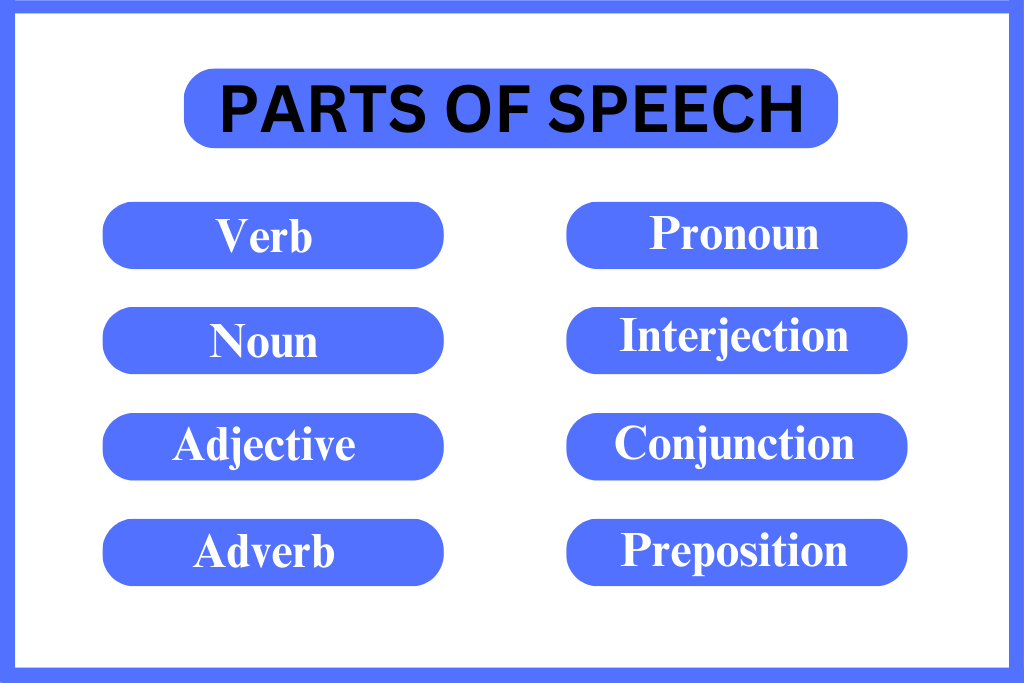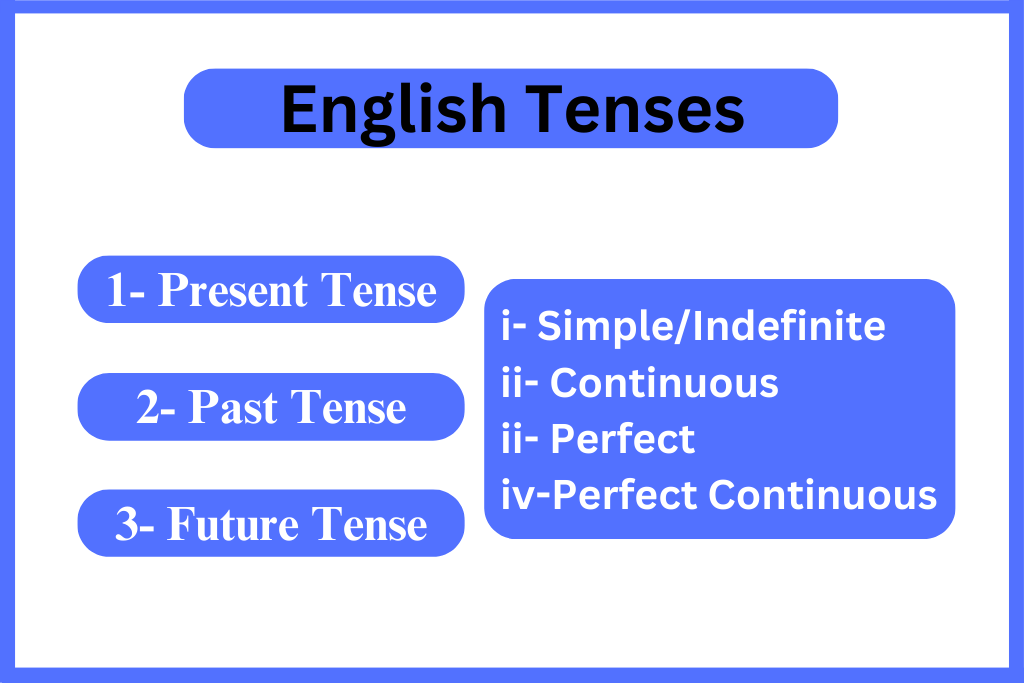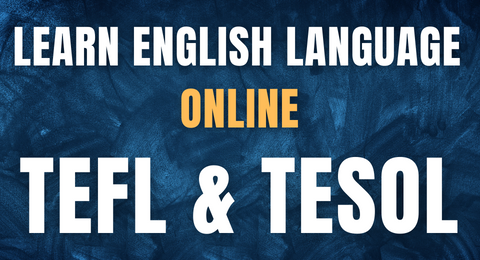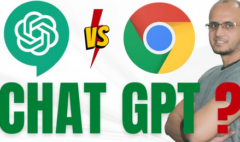Learn English Language Online TEFL and TESOL

Learn English Language Online TEFL Teaching of English as a Foreign Language and TESOL Teaching English to Speakers of Other Languages
English Alphabet Capital Vs Small Letters
1- (Blue)> Aa
2- (Red)> Bb Cc Dd Ee
3- (Green)> Ff Gg Hh Ii
4- (Orange)> Jj Kk Ll Mm
5- (Purple)> Nn Oo Pp Qq
6- (Yellow)> Rr Ss Tt Uu
7- (Grey)> Vv Ww Xx
8- (Maroon)> Yy
9- (Black)> Zz
1- Learn English Language Online / Tenses (Present+Past+Future)
Simple/Indefinite + Continuous + Perfect + Perfect Continuous
i- Present Tense
Present Indefinite: He writes letter every day.
Present Continuous: He is writing a letter now.
Present Perfect: He has already written a letter.
Present Perfect Continuous: He has been writing a letter since morning.
ii- Past Tense
Past Indefinite: He wrote a letter yesterday.
Past Continuous: He was writing a letter at 5 O’clock yesterday.
Past Perfect: He had already written a letter.
Past Perfect Continuous: He had been writing a letter for two hours when I came.
iii- Future Tense
Future Indefinite: He will write a letter tomorrow.
Future Continuous: He will be writing a letter at 5 O’clock tomorrow.
Future Perfect: He will have written a letter at 5 O’clock tomorrow.
Future Perfect Continuous: He will have been writing a letter for 2 hours when I come.

2- Learn English Language Online / Tenses (Present + Past + Future)
Simple/Indefinite + Continuous + Perfect + Perfect Continuous
i- Present Tense
Present Indefinite: I study English. / I read a book. / He reads a book.
Present Continuous: I am studying English. / Alex is going to school.
Present Perfect: I have studied English. / Alex has reached school.
Present Perfect Continuous: I have been studying English. / Alex has been reaching school.
ii- Past Tense
Past Indefinite: I studied English yesterday. / Alex worked hard.
Past Continuous: I was studying English. / Alex was working hard.
Past Perfect: I had studied English. / Alex had worked hard.
Past Perfect Continuous: I had been studying English. / Alex had been working hard.
iii- Future Tense
Future Indefinite: I will study English. / He will go to school.
Future Continuous: I will be studying English. / He will be going to school.
Future Perfect: I will have studied English. / He will have gone to school.
Future Perfect Continuous: I will have been studying English. He will have been going to school.
3- Learn English Language Online / Tenses (Affirmative + Negative & Interrogative)
A- Present
- Present Indefinite (Simple):
- Affirmative: I have a car.
- Negative: I don’t have a car.
- Interrogative: Do I have a car?
- Present Continuous:
- Affirmative: You are playing football now.
- Negative: You are not playing football now
- Interrogative: Are you playing football now?
- Present Perfect:
- Affirmative:
- Negative:
- Interrogative:
- Present Perfect Continuous:
- Affirmative:
- Negative:
- Interrogative:
B- Past
- Present Indefinite (Simple):
- Affirmative:
- Negative:
- Interrogative:
- Present Continuous:
- Affirmative:
- Negative:
- Interrogative:
- Present Perfect:
- Affirmative:
- Negative:
- Interrogative:
- Present Perfect Continuous:
- Affirmative:
- Negative:
- Interrogative:
C- Future
- Present Indefinite (Simple):
- Affirmative:
- Negative:
- Interrogative:
- Present Continuous:
- Affirmative:
- Negative:
- Interrogative:
- Present Perfect:
- Affirmative:
- Negative:
- Interrogative:
- Present Perfect Continuous:
- Affirmative:
- Negative:
- Interrogative:
4- Learn English Language Online / Tenses (Rules/Structure)
Simple/Indefinite + Continuous + Perfect + Perfect Continuous
i- Present Tense
Present Indefinite: Subject + Verb(1) + s/es + Object
Jack goes to school y train.
Present Continuous: Subject + is/am/are + Verb(1) + ing + Object
Jack is going to school by train.
Present Perfect: Subject + has/have + Verb(3) + Object
Jack has gone to school by train.
Present Perfect Continuous: Subject + has/have + been + Verb(1) + ing + Object
ii- Past Tense
Past Indefinite: Subject + Verb(1) + Object
Jack went to school by train.
Past Continuous: Subject + was/were + Verb(1) + ing + Object
Jack was going to school y train
Past Perfect: Subject + had + Verb(3) + Object
Jack had gone to school by train.
Past Perfect Continuous: Subject + had + been + Verb(1) + ing + object
iii- Future Tense
Future Indefinite: Subject + will/shall + Verb(1) Object
Jack will go to school by train.
Future Continuous: Subject + will be/shall be + Verb(1) + ing + Object
Jack will be going to park by train
Future Perfect: Subject + will have + Verb(3) + Object
Jack will have gone to park by train
Future Perfect Continuous: Subject + will have been + Verb(1) + ing + Object
Jack will have been going to park by train for three months
5- Learn English Language Online / Tenses (Concept of Sentences Present + Past + Future)
i- Present Tense
It tells about current situation, what is happening right now.
Example: He lives in USA. / He is in class 5.
ii- Past Tense
It tells us about past / previous condition, What has already happen.
Example: He lived in USA. / He was in class 5 last year.
iii- Future Tense
It tells us about future, What will happen later in future.
Example: He will live in USA. / He will be in class 6 in next year.
6- Learn English Language Online / (Parts of Speech)
A. Nouns:
Nouns are first part of speech. Nouns are an important part of speech that include words which are used to name places, people, animal, objects and ideas. Anything we can touch, feel, see, smell, taste, hear & hold can be referred to as nouns. Every sentence has a noun according to its structure.
Example: –
Places: china + Japan + bedroom + ground + swimming pool
People: person + women + girl + President
Animal: cat + dog + snake + fish
Objects: fan + car + fridge + truck + bag + blackboard
Ideas: arguments + discussion + evolution + invention
B. Types of Nouns
i- Proper Nouns
Nouns that are specifically used to name a person, thin or place are called a proper noun. Proper nouns always begin with a capital letter.
ii- Common Nouns
Common nouns are those nouns wo refer to a generic item, place or group. Common nouns are not capitalized unless they appear at the start of a sentence.
iii- Singular Nouns
Singular nouns are nouns tat are used to name a single person, animal, bird, place or object.
iv- Plural Nouns
Plural nouns are those nouns that are refer to a number o people, places, animal or thing wit addition of s / es / ies / ves to te existing main word.
v- Countable Nouns
Countable nouns are those nouns that can be counted or measured.
vi- Uncountable Nouns
Uncountable nouns are those nouns that can not be counted. It is also called concrete and abstract nouns.
vii- Collective Nouns
Collective nouns are those nouns that are used to name a group of objects, animals or people.
viii- Concrete Nouns
Concrete nouns are those nouns that are referred to objects that are material and can be perceived by the human senses.
ix- Abstract Nouns
Abstract nouns are those nouns that cannot be perceived by the five senses of the human body are called an abstract nouns.
7- Learn English Language Online / (Test)
i- I / We / You / They (Have)
ii- He / She / It (Has)
iii- I was born …………. January. (at/in/on) ?
iv- I will take a course …………… improve my English. (so as/ for/ in order to) ?
v- Does she ………… a car. (has / have) ?
vi- He …………. to school. (went / goes / has gone) ?
vii- We are able to speak English beacuse we studied hard …………….. it. (to do / for / by do) ?
viii- Does he …………….. English very well. (speak / speaks) ?
ix- He …………….. English very well. (speak / speaks) ?
8- Learn English Language Online / (Active Voice & Passive Voice)
i- Present
- Present Indefinite (Active) Alex plays hockey.
- Present Indefinite (Passive) Hockey is played by Alex.
- Present Continuous (Active) Alex is playing hockey.
- Present Continuous (Passive) Hockey is being played by Alex.
- Present Perfect (Active) Alex has played hockey.
- Present Perfect (Passive) Hockey has been played by Alex.
- Present Perfect Continuous (Active) Alex has ben playing hockey.
- Present Perfect Continuous (Passive) No Passive.
ii- Past
- Past Indefinite (Active) Alex played hockey.
- Past Indefinite (Passive) Hockey was played by Alex.
- Past Continuous (Active) Alex was playing hockey.
- Past Continuous (Passive) Hockey was bein played by Alex.
- Past Perfect (Active) Alex had played hockey.
- Past Perfect (Passive) Hockey had been played by Alex.
- Past Perfect Continuous (Active) Alex had been playing hockey.
- Past Perfect Continuous (Passive) No Passive.
iii- Future
- Future Indefinite (Active) Alex will play hockey.
- Future Indefinite (Passive) Hockey will be played by Alex.
- Future Continuous (Active) Alex will be playing hockey.
- Future Continuous (Passive) No Passive.
- Future Perfect (Active) Alex will have played hockey.
- Future Perfect (Passive) Hockey will have been played by Alex.
- Future Perfect Continuous (Active) Alex will have been playing hockey.
- Future Perfect Continuous (Passive) No Passive.
9- Learn English Language Online / (Change of Pronouns)
Active: I, Passive: Me
Active: We, Passive: Us
Active: He, Passive: Him
Active: She, Passive: Her
Active: They, Passive: Them
Active: It, Passive: It
10- Learn English Language Online / Correlative Conjunctions
Conjunction: Example:
- Both/And: The company deals in both software and hardware.
- Either/Or: I will eat either carrots or peas for dinner.
- Neither/Nor: Alex, likes neither milk nor chocolate cake.
- Whether/Or: Do you care whether we have noodles or rice for dinner?
- Not only/But (also): He not only studies hard butt also works well.
- Such/That: Its such a tiny kitchen that I don’t have to do much to keep it clean.
- Scarcely/When: Scarcely had she entered the room when the phone rang.
- No sooner/Then: No sooner did he enter the room then he saw a snake.
12- Learn English Language Online / Use of Make
- Please let me make a suggestion.
- At work you can make a proposal.
- I you are not carful you can make a mistake.
- In the kitchen you can make lunch or dinner.
- You make a phone call.
- I you need to see the doctor you make an appointment.
- You make a change in your job.
- When you have two options, you make a choice.
11- Learn English Language Online / Use of Wish & Had
- I wish I had a big house.
- I wish I had a car.
- I wish I had a laptop.
- I wish I had an iphone.
- I wish I had a lot of money.
- I wish I had good communication skills.
- I wish I had better knowledge.
- I wish I had a good job in company.
13- Learn English Language Online / Use of May (Permission) & Might (Low possibility)
Possibility:
- It may rain today.
- It might rain today.
- He may come today.
Permission:
- May I come in?
- You may take the book.
- Might I use your phone?
Wishes & Blessings:
- May you be happy.
- May God bless you.
Show Dissatisfaction:
- You might come little earlier.
- You might earn more money.
- You might take care of your sister.
Indirect Speech:
- He said that it might be true.
- He said that he might go to China.
14- Learn English Language Online / Use of Let & Lets
Let means to allow or take permission someone to do something. Let’s means when we work together or do something with someone.
Let:
- Let me have some food.
- Let me write the letter.
- Let me read the book.
- Let me play football.
- Let me do the work.
- Let me go there.
- Let me see.
- Let her go.
Let’s:
- Let’s go home.
- Let’s go or a walk.
- Let’s go to the party.
- Let’s go to the garden.
- Let’s help the poor man.
- Let’s arrange a meeting.
- Let’s meet the chairman.
- Let’s go to the restaurant.
Related Posts
What Is Chat GPT – How Does Chat GPT Work – Chat GPT Vs Google
What is Email Marketing and Usage of Email Marketing in Business
What is Lead Generation
How To Optimize LinkedIn Profile For Recruiters
How To Apply On LinkedIn For Jobs – Easy Apply On LinkedIn
Search
Categories
Popular Tags







